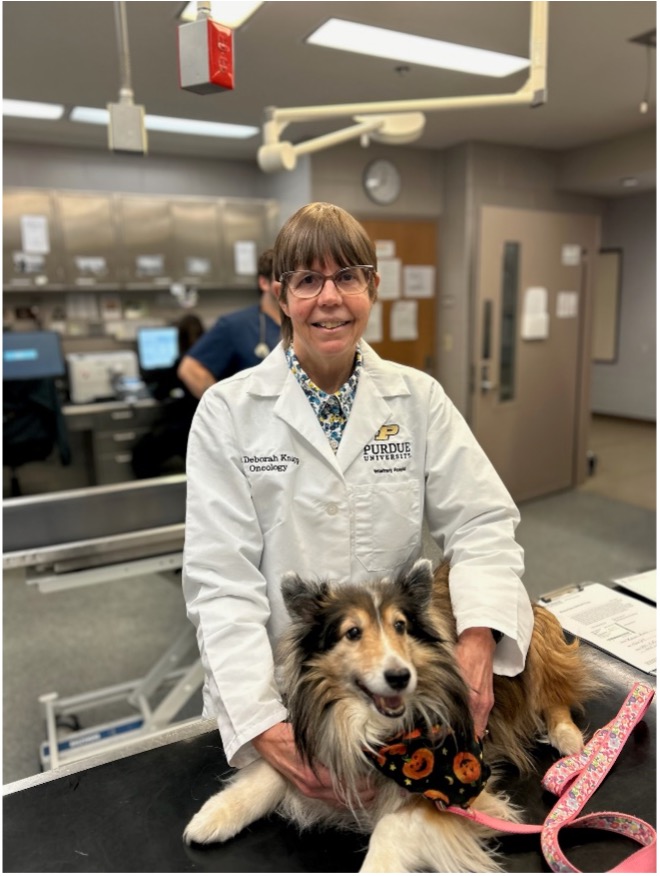Study enrolls dogs with urothelial carcinoma to assess anti-cPD-L1 monoclonal antibody (mAb) safety and efficacy, with potential applications for human treatments.
WEST LAFAYETTE, Ind., and BEVERLY, Mass. (November 19, 2024) – Purdue University and its College of Veterinary Medicine, in partnership with Akston Biosciences Corporation, has initiated the enrollment of dogs with urinary bladder cancer in a clinical trial of a pioneering immunotherapy. The immunotherapy consisting of an anti-cPD-L1 monoclonal antibody (mAb) is designed to target and block the cPD-L1 protein on cancer cells. This, in turn, is expected to enhance the immune system’s ability to attack the cancer cells more effectively to improve outcomes and extend life. The strategic partnership between Purdue and Akston was announced in August after the underlying technology was developed at the College of Veterinary Medicine and the Purdue Institute for Cancer Research (PICR).
Invasive urothelial carcinoma (InvUC), also known as transitional cell carcinoma (TCC), is the most common and aggressive type of urinary bladder cancer in dogs. While it often starts in the bladder, it can also develop in other parts of the urinary tract and can spread to the lymph nodes, lung, liver and other organs. Although the treatment of InvUC has improved over several years, and the quality of life while living with the cancer can be quite good, the cancer is rarely curable. Over time, the cancer typically develops resistance to treatment and progresses.
The trial, which evaluates the safety, pharmacokinetics, and antitumor effects of the mAb, is supported by a National Cancer Institute (NCI) grant involving the PRE-medical Cancer Immunotherapy Network Canine Trials Consortium (PRECINCT) U01 program. The trial is also supported by the Werling Comparative Oncology Research Center (WCORC) at the Purdue University College of Veterinary Medicine, and aligns with Purdue’s One Health initiative to advance university strengths in human, animal plant, and environmental health.
Parallel studies will also be performed to determine the effects of the mAb on the anti-tumor immune responses in the dogs, insights that hold the potential to advance immunotherapy approaches for both canine and human cancer patients.

Millie, a 10-year-old Shetland Sheepdog (Sheltie), is the first dog to receive the anti-cPD-L1 mAb. It was not surprising that Millie developed bladder cancer. According to Deborah W. Knapp, DVM, MS, Director of the WROC, Distinguished Professor of Comparative Oncology and Purdue’s lead veterinarian on the study, there is a threefold to fivefold increased risk in Shetland sheepdogs when compared with the risk in mixed-breed dogs1. The team is excited that Millie has the opportunity to benefit from the new therapy.
Akston Biosciences, which holds an exclusive option to license the anti-cPD-L1 mAb, also serves as a Contract Development and Manufacturing Organization (CDMO), developing and producing the antibody at its Beverly, Mass., facility for the trial. Akston’s rich pipeline also contains candidates for conditions in animals for chronic pain, atopic dermatitis and obesity.
For more information or to participate in the trial, please visit Werling Comparative Oncology Research Center (WCORC) at Purdue at https://vet.purdue.edu/wcorc/clinical-trials/.
About Akston Biosciences
Akston Biosciences Corporation is accelerating the biologics revolution in Animal Health by licensing, inventing, developing, and manufacturing protein therapeutics for veterinary applications. With a kilogram-scale cGMP manufacturing facility dedicated to Animal Health, Akston reduces time and costs from discovery to commercialization. Akston uses its Ambifect® Fc-fusion platform to create innovative, extended-duration biologics and therapeutic vaccines. The company’s facilities are in Beverly, Massachusetts. For more information, visit www.akstonbio.com.
About Purdue University
Purdue University is a public research institution demonstrating excellence at scale. Ranked among the top 10 public universities and with two colleges in the top four in the United States, Purdue provides knowledge at an unmatched quality and scale. With more than 105,000 students across various platforms, including nearly 50,000 in-person on the West Lafayette campus, Purdue’s commitment to affordability and accessibility has kept main campus tuition frozen for 13 years. Discover how Purdue continues to strive for the next giant leap, including the One Health initiative, its comprehensive urban campus in Indianapolis, the Mitch Daniels School of Business, Purdue Computes, at www.purdue.edu.
1Knapp DW, Ramos-Vara JA, Moore GE, Dhawan D, Bonney PL, Young KE. Urinary bladder cancer in dogs, a naturally occurring model for cancer biology and drug development. ILAR J. 2014;55(1):100–18.
Contact for Akston Biosciences:
Julie Lawless
Lawless Strategic Communications
Julie.lawless@lawlesscomms.com
+1 615-585-5861






